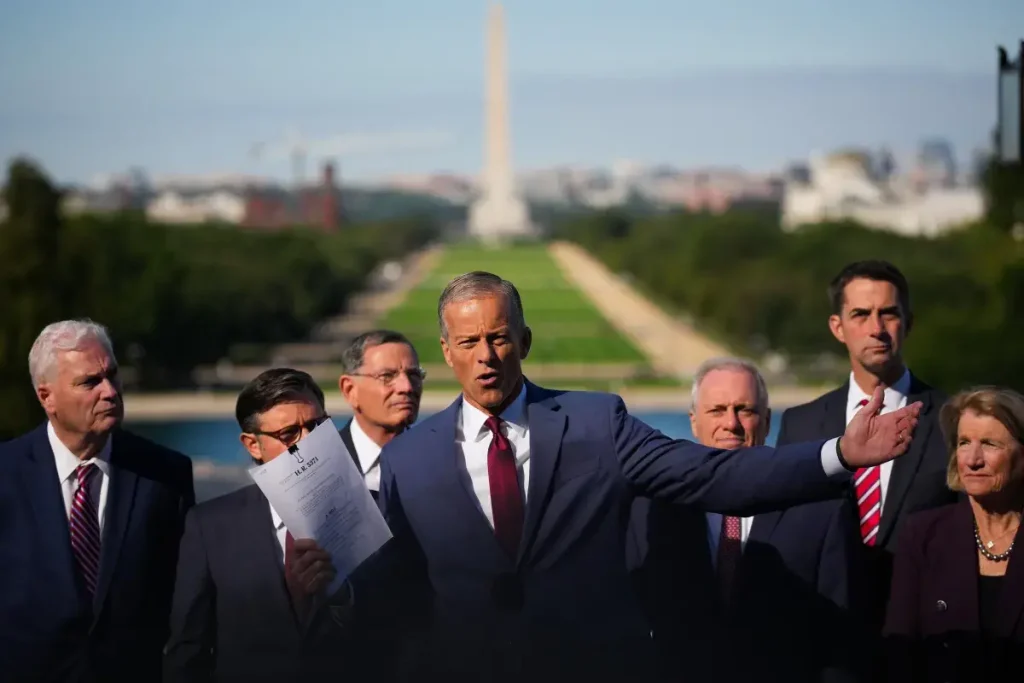Senate Majority Leader Thune Signals Openness to Healthcare Negotiations Amid Government Shutdown
In a candid interview with Politico that has captured the attention of Washington insiders, Republican Senate Majority Leader John Thune of South Dakota offered what some see as a potential pathway through the current government shutdown impasse. Thune indicated he would be willing to engage in negotiations regarding healthcare reform, specifically addressing the Affordable Care Act (ACA), if a “critical mass” of Democrats—ideally ten or more—would support the House-passed continuing resolution to temporarily fund the government through November 21. This potential opening comes as federal agencies remain shuttered in the first government shutdown in six years, with hundreds of thousands of federal employees furloughed or working without immediate pay. “I keep telling them: When they have eight or 10—preferably 10, or more—when they have a critical mass, let me know if there’s a conversation they want to have,” Thune told Politico, suggesting some behind-the-scenes dialogue might already be taking place between members of both parties.
The current shutdown dramatically illustrates the profound partisan divide that has come to characterize American politics, particularly around healthcare policy. Democrats have been steadfast in their demands for an immediate extension of enhanced ACA subsidies and reversal of Medicaid cuts, positioning these healthcare concerns as non-negotiable elements of any funding agreement. Republicans, meanwhile, have insisted that passing their clean continuing resolution is the only realistic path to reopening government operations. This fundamental disagreement has real-world consequences extending far beyond the halls of Congress. The shutdown is disrupting essential services for millions of Americans and further straining a federal workforce already depleted by record departures this year. Economic analysts warn that prolonged government closure could ripple through the broader economy, potentially affecting everything from small business loans to food safety inspections.
What makes Thune’s comments particularly noteworthy is the slight but significant shift in tone they represent. While maintaining that substantive extensions of healthcare subsidies or broader reforms couldn’t be negotiated until after government operations resume, his acknowledgment that “some of those conversations are happening” suggests more flexibility than previous Republican statements. “With our members and their members, there’s a lot of back-and-forth going on right now about some of the things they would like to see happen,” Thune revealed, offering a glimpse into discussions that typically remain private during such high-stakes political standoffs. The majority leader was careful, however, to temper expectations about what might ultimately be achievable, noting, “What I can’t guarantee, of course, is an outcome and, in particular, one that would clear in the House too.” This cautious phrasing reflects the complex reality of America’s divided government, where any compromise must navigate multiple legislative hurdles.
The shutdown’s timing couldn’t be more politically charged, coming just weeks before a presidential election that many analysts already describe as historically divisive. Both parties appear to be calculating not just the immediate policy implications of the funding fight but also how their positions will play with voters in November. On social media platform X, Thune pointedly reminded the public that “Democrats passed CRs 13 different times when they had the majority and Biden was president,” suggesting the current opposition is more about politics than policy. “They have lost all rationale when it comes to their hatred for President Trump,” he continued, framing Democrats’ resistance as personally motivated rather than substantively driven. Senate Minority Leader Chuck Schumer countered with his own message: “Republicans shut down the government because they can’t be bothered to protect health care for Americans across this country. Premiums are set to more than double! Americans cannot afford this.”
For ordinary Americans caught in the middle of this political battle, the abstract debate over continuing resolutions and healthcare subsidies translates into concrete anxieties about access to critical government services and potential financial hardship. Federal workers—many of whom live paycheck to paycheck—face uncertain timelines for receiving compensation. Meanwhile, the shutdown affects everything from national park operations to scientific research to food assistance programs, with impacts that grow more severe the longer the impasse continues. Healthcare concerns loom particularly large, as the expiration of enhanced ACA subsidies could indeed lead to substantially higher insurance premiums for millions of families already struggling with inflation and economic uncertainty. This human dimension of the shutdown often gets overshadowed by the political theater in Washington, yet it represents the true stakes of the standoff.
What happens next remains uncertain, but Thune’s comments suggest at least the possibility of movement beyond entrenched positions. His statement that “everybody realizes we want solutions” indicates some recognition of the political costs both parties face if the shutdown drags on indefinitely. The question becomes whether enough Democrats will take up Thune’s implicit offer to support the temporary funding measure in exchange for future healthcare negotiations, or whether they’ll maintain their position that healthcare protections must be addressed simultaneously with government funding. The White House position will also prove critical, as any sustainable compromise would likely require presidential support. As this situation continues to evolve, Americans can only hope that the “back-and-forth” Thune referenced eventually yields the “critical mass” necessary to restore government operations while addressing the legitimate healthcare concerns at the heart of this dispute.















